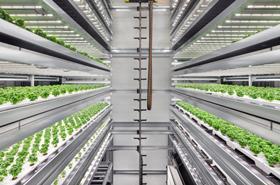
Infarm has announced that it is partnering with Wageningen University & Research (WUR) to study and evaluate how to optimise production while maximising flavour, nutrition and yield of vertically grown hydroponic tomatoes.
As part of the collaboration, the vertical farming group will cover the total costs necessary to complete three interrelated projects over the next four years, funding two PhDs and one post-doctoral researcher based at WUR.
Additionally, Infarm’s crop genetics team will establish a base on WUR’s campus located in the Netherlands’ so-called 'FoodValley'' region, known as the heart of Agritech innovation in Europe.
“This pioneering research programme undertaken with Infarm will lead to new knowledge of plant-environment interactions, plant physiology, mathematical modelling, sensor technology,” said Leo Marcelis, lead investigator and head of WUR’s chair group Horticulture and Product Physiology.
“For Wageningen University & Research, this partnership with Infarm is a fantastic opportunity to operationalise experimental results, as the research environment represents the growth environment,' Marcelis continued. 'Therefore, the data and insights which Infarm and WUR gather will be applicable to immediately improve the yield and quality of tomato harvests, while conserving resources like water and energy, with huge implications for the vertical farming industry as a whole.”
Infarm has already established a cloud connected network of more than 1,400 vertical farms in stores and Infarm Growing Centers in North America, Asia and Europe.
“Infarm is committed to using the billions of data points generated by our cloud-connected farming network to rapidly expand our catalogue of saleable crops and grow the consumer’s full fruit and vegetable basket,” said Infarm’s co-founder and chief technology officer Guy Galonska.
“We recognise that tomatoes and other fruiting crops grown locally and sustainably represent a huge growth opportunity for both Infarm and the vertical farming industry. By partnering with the renowned Horticulture & Product Physiology chair group at WUR, Infarm plugs into the center of global innovation for horticultural research.
'In close collaboration with researchers at WUR, Infarm’s crop science team will identify ways to reduce overall costs while improving the quality of tomato harvests in Infarm’s Growing Centers,' he noted. 'The goal is to offer consumers premium quality tomatoes with better taste, more diversity and higher nutritional value at an affordable price, grown locally, year-round.”
“In the coming years, consumers will be able to purchase a much wider range of Infarm produce, including tomatoes, strawberries, peppers and mushrooms,” explained Infarm’s director of crop science and WUR alumnus, Pavlos Kalaitzoglou. “This is just the beginning of Infarm’s partnership with Wageningen University & Research.
'We aim to collaborate closely with WUR faculty and post-graduate staff on a number of exciting projects,' he oulined. 'Alongside our growing Crop Genetics team based in Wageningen, this work will pave the way for Infarm to produce a number of crops, including staple crops like cereals or rice, which haven’t been attempted before by a vertical farming company at scale.”
The research program consists of three interlinked research projects, each overseen by a PhD or post-doctoral researcher based at WUR.
The work uses state-of-the-art sensors and scanners to evaluate the growth rate, health and nutrient content of the tomatoes.
Two projects will examine the efficiency of light interception and distribution of tomatoes growing in a hydroponic farming system using an innovative 3D scanning procedure.
Looking at a variety of factors such as the physical properties of the tomatoes and the optimum amount of light, these interventions will enable Infarm to scale up its tomato production in its large-scale farming units on a global level to meet consumer demand for fresh tomatoes year-round.



